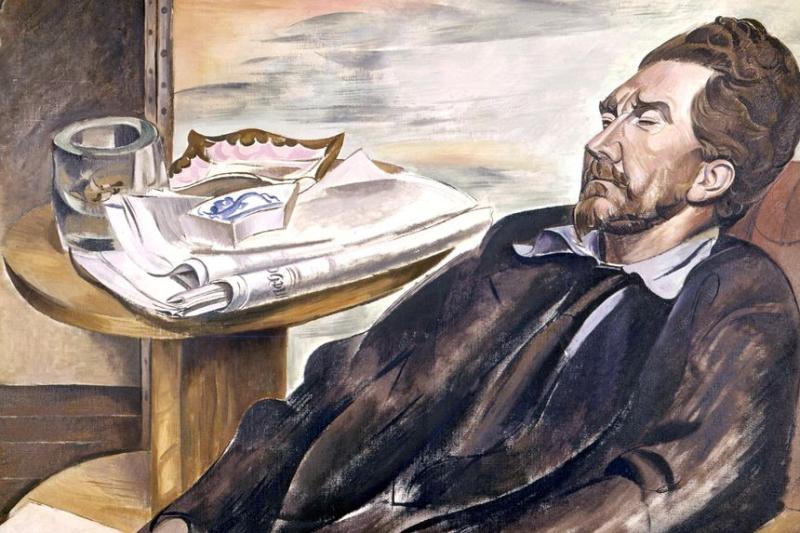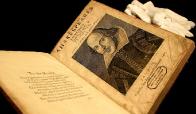'The Poets of Rapallo' Review: Ezra Pound's Fascist Paradise
By: WSJ



Percy Shelley called poets the "unacknowledged legislators of the world." No poet sought acknowledgment more enthusiastically than Ezra Pound. No poet legislated so ambitiously or disastrously, either. Pound was the impresario of Modernism. He stripped the Victorian padding from the verse of T.S. Eliot and W.B. Yeats, launched magazines and the Imagist movement, and published the first chapters of Joyce's "Ulysses." He was also a fascist and fanatical anti-Semite who propagandized on the radio for Mussolini's regime. After the war, Pound's friends and fans, Eliot among them, convinced the American authorities that he was not bad, just mad. He was lucky not to be executed as a traitor.
Lauren Arrington's "Poets of Rapallo" is a fascinating, intricate study of Pound's first steps on the road to perdition, and the cast of fellow travelers, Yeats among them, who went part of the way with him and then covered their tracks. In 1924, two years after Mussolini's ascent to power, Pound and his wife Dorothy moved to Rapallo, Italy, a resort town not far from Genoa. Pound had already antagonized his way through London and Paris and was writing his "Cantos" on the Renaissance warlord, pagan revivalist and connoisseur Sigismondo Malatesta.
“It would be quite easy to make Italy the intellectual centre of Europe . . . by gathering 10 or 15 of the best writers and artists,” Pound wrote to the sculptor Nancy Cox-McCormack, who was then working on a bust of Mussolini. The fascists valued literature and the arts: If biology was the soil of fascism, history and aesthetics were the manure. A poet, Gabriele D’Annunzio, had shaped the fascist aesthetic of black shirts and the call-and-response ritual in the stadium. But Italy’s fascists had no program for “specific action.” Like Malatesta at Rimini, Pound could create a “corte letteraria,” a literary court, for Mussolini. As modern poets write grant applications, so Pound auditioned as a publicist for Il Duce.
The trains, notoriously, ran on time in the new Italy. Violence and bigotry ran just as reliably beneath the smooth modern lines of fascist life. This was how Pound preferred it. Like Wagner before him and Andrew Breitbart after him, Pound saw that “politics is downstream from culture.” Liberal democracy had led to World War I. The violent eruption of new styles in verse, the imposition of artistic order by a literary strongman and the total aesthetic experience were anticipations of revival. The rubber truncheons and deportations were mere birth-pangs. “We are restarting civilization,” Pound told the English poet Richard Aldington.
W.B. Yeats agreed. A senator in the Irish parliament, Yeats hoped that Italian fascism could provide a model for the revival of Ireland, which had obtained autonomy within the British Empire in 1922. The fascist was the true “individualist,” Nietzsche’s Übermensch, the only man strong enough to resist mass conformity. Tomorrow, he believed, belonged to “authoritative” government by “highly trained intellects” who appreciated the arts. In 1924 Yeats gave a speech at the opening of the Tailteann Games, an Irish nationalist Olympics, and approvingly quoted Mussolini: “We will trample upon the decomposing body of the Goddess of Liberty.” Yeats’s own body, meanwhile, was doing little better. It was a bad bout of the flu, as much as the fascist romance of vital energies and fresh blood, that brought Yeats and his wife Georgie to Rapallo in February 1928.
Ezra and Dorothy Pound had already hosted several highly trained intellects at their budding “Ezuversity.” The young British art critic Adrian Stokes visited with Spengler’s “Decline of the West” in his trunk and on his mind. Richard Aldington was a poet whose experience in the trenches had caused a delayed nervous breakdown, and whose marriage to the Imagist poet Hilda Doolittle (“H.D.”) was disintegrating. Ernest Hemingway visited, but he saw Mussolini for what he was, and where the cult of violence would lead: “don’t ever call me on Dago politics,” he told Pound in 1926. Two younger poets apprenticed themselves to Pound: first Basil Bunting, a Quaker from Northumberland who during World War I had been imprisoned as a conscientious objector, and then, in 1933, Louis Zukofsky, a Jewish Marxist from New York whose conscience, he insisted, had no objection to Pound’s anti-Semitic ranting.
Pound was already promoting himself and the new poetry as literary editor of the Rapallo newspaper, Il Mare. With Yeats as a regular visitor, he launched a magazine, The Exile, in 1927. Ms. Arrington, a professor at the National University of Ireland (Maynooth), provides an assured, illuminating account of the poets’ mutual influence. Pound was not as smart a politician as he thought—his rival Wyndham Lewis, who had just launched The Enemy, called him a “revolutionary simpleton”—but Pound was an accomplished maker of avant-garde waves. The Pound-Yeats relationship, Ms. Arrington writes, “swerved between subdued collaboration and outright denunciation.” This creative tension, combined with the pleasures of fascist dreams in the sun, sparked Yeats’s late efflorescence in poems like “Sailing to Byzantium,” which appeared in The Exile, and the collection “The Winding Stair.”
There was no need for bed-hopping in Rapallo, because the beds had long been hopped. Aldington came with his new girlfriend, the poet Brigit Patmore, but was still married to H.D., who had been engaged to Pound when Pound proposed to Dorothy Shakespear, whom Yeats had been in love with at the time, (and whose mother, Olivia, had been Yeats’s first lover). Yeats married Georgie Hyde-Lees, who was Dorothy Shakespeare’s step-cousin; the two, Ms. Arrington writes, were “as close as sisters.” Pound was the best man at Yeats’s wedding; soon afterward, he sought to prove he was the better man through a fling with Iseult Gonne, to whom Yeats had proposed in 1915, and whose mother Maud was Yeats’s perennial obsession.
Aldington and Bunting are nearly forgotten, and Zukofsky is remembered as the least likely Poundian of them all. Ms. Arrington recovers their stories, as well as that of Dorothy Pound. Dorothy, H.D. sniped, was “very English and ‘cold’,” and there was, she said, “a pretty general consensus of opinion” in London that Dorothy had not been “awakened.” In Italy, Dorothy was certainly awake to the potential of fascist aesthetics. Her apparently harmless hobby, collecting postcards with photographs of ancient Roman architecture, some of it restored by the fascists, was in fact the assembly of a fascist image-bank. Previously an amateur Vorticist, she became an enthusiast of Futurism, practicing “metaphysical painting.” When Ms. Arrington notes that Dorothy’s art was “unmediated” by the macho poets around her, it is not clear if she is damning Dorothy as a fascist or praising her as a feminist.
All this cultural ferment ended first in the usual way, and then in an unusual way that haunted all the participants. The wit and cartoonist Max Beerbohm, whose retirement in Rapallo was interrupted by Pound’s shenanigans, observed how Pound’s “treacle of admiration” came “strongly tinctured with the vinegar of envy.” Pound styled himself “the Master of Rapallo,” but Yeats was his poetic superior. In 1934, their artistic revolution ended in a shouting match in Rapallo. Meanwhile, Hitler had come to power in 1933, and the truth about Mussolini’s dictatorship was, as it ended its first decade, beginning to become undeniable. Bunting fell out with Pound over his anti-Semitic goading of Zukofsky. By 1941 Aldington expressed “deep contempt” for Pound.
Travellers already versed in the timetables of Modernist biography will appreciate Ms. Arrington’s detailed account of influence and antagonism and how deeply Yeats in particular sank into aesthetic fascism. But “The Poets of Rapallo” is not a narrative, and the author gives little context. Day-trippers to this strange time and place may feel they have landed amid a drama without a plot. Then again, no one lost the plot more dramatically than Pound.
Mr. Green is the author, most recently, of “The Religious Revolution: The Birth of Modern Spirituality, 1848-1898.”



